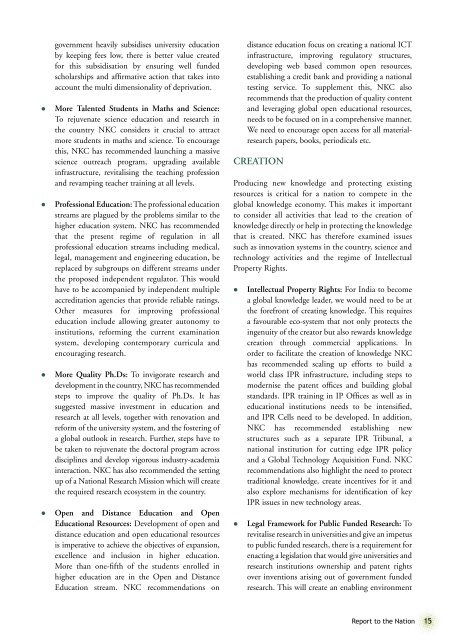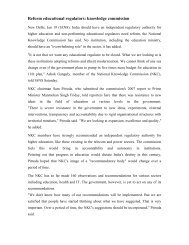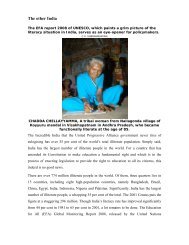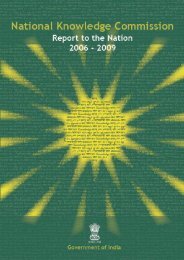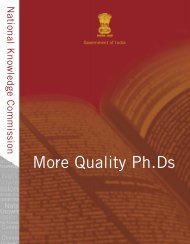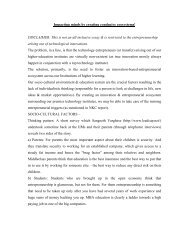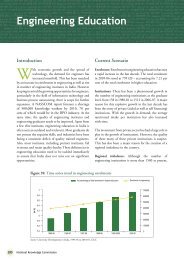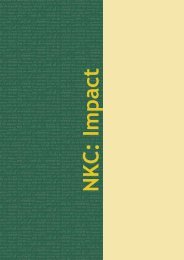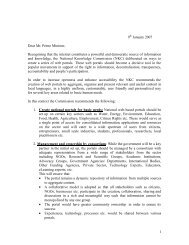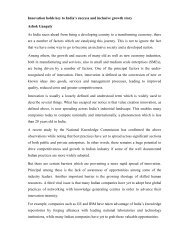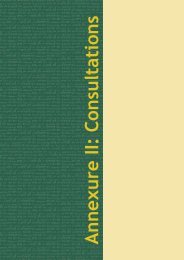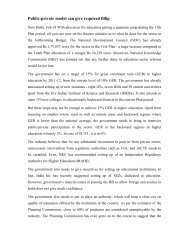National Knowledge Commission Report to the Nation 2009: Overview
National Knowledge Commission Report to the Nation 2009: Overview
National Knowledge Commission Report to the Nation 2009: Overview
Create successful ePaper yourself
Turn your PDF publications into a flip-book with our unique Google optimized e-Paper software.
government heavily subsidises university education<br />
by keeping fees low, <strong>the</strong>re is better value created<br />
for this subsidisation by ensuring well funded<br />
scholarships and affirmative action that takes in<strong>to</strong><br />
account <strong>the</strong> multi dimensionality of deprivation.<br />
• More Talented Students in Maths and Science:<br />
To rejuvenate science education and research in<br />
<strong>the</strong> country NKC considers it crucial <strong>to</strong> attract<br />
more students in maths and science. To encourage<br />
this, NKC has recommended launching a massive<br />
science outreach program, upgrading available<br />
infrastructure, revitalising <strong>the</strong> teaching profession<br />
and revamping teacher training at all levels.<br />
• Professional Education: The professional education<br />
streams are plagued by <strong>the</strong> problems similar <strong>to</strong> <strong>the</strong><br />
higher education system. NKC has recommended<br />
that <strong>the</strong> present regime of regulation in all<br />
professional education streams including medical,<br />
legal, management and engineering education, be<br />
replaced by subgroups on different streams under<br />
<strong>the</strong> proposed independent regula<strong>to</strong>r. This would<br />
have <strong>to</strong> be accompanied by independent multiple<br />
accreditation agencies that provide reliable ratings.<br />
O<strong>the</strong>r measures for improving professional<br />
education include allowing greater au<strong>to</strong>nomy <strong>to</strong><br />
institutions, reforming <strong>the</strong> current examination<br />
system, developing contemporary curricula and<br />
encouraging research.<br />
• More Quality Ph.Ds: To invigorate research and<br />
development in <strong>the</strong> country, NKC has recommended<br />
steps <strong>to</strong> improve <strong>the</strong> quality of Ph.Ds. It has<br />
suggested massive investment in education and<br />
research at all levels, <strong>to</strong>ge<strong>the</strong>r with renovation and<br />
reform of <strong>the</strong> university system, and <strong>the</strong> fostering of<br />
a global outlook in research. Fur<strong>the</strong>r, steps have <strong>to</strong><br />
be taken <strong>to</strong> rejuvenate <strong>the</strong> doc<strong>to</strong>ral program across<br />
disciplines and develop vigorous industry-academia<br />
interaction. NKC has also recommended <strong>the</strong> setting<br />
up of a <strong><strong>Nation</strong>al</strong> Research Mission which will create<br />
<strong>the</strong> required research ecosystem in <strong>the</strong> country.<br />
• Open and Distance Education and Open<br />
Educational Resources: Development of open and<br />
distance education and open educational resources<br />
is imperative <strong>to</strong> achieve <strong>the</strong> objectives of expansion,<br />
excellence and inclusion in higher education.<br />
More than one-fifth of <strong>the</strong> students enrolled in<br />
higher education are in <strong>the</strong> Open and Distance<br />
Education stream. NKC recommendations on<br />
distance education focus on creating a national ICT<br />
infrastructure, improving regula<strong>to</strong>ry structures,<br />
developing web based common open resources,<br />
establishing a credit bank and providing a national<br />
testing service. To supplement this, NKC also<br />
recommends that <strong>the</strong> production of quality content<br />
and leveraging global open educational resources,<br />
needs <strong>to</strong> be focused on in a comprehensive manner.<br />
We need <strong>to</strong> encourage open access for all materialresearch<br />
papers, books, periodicals etc.<br />
CREATION<br />
Producing new knowledge and protecting existing<br />
resources is critical for a nation <strong>to</strong> compete in <strong>the</strong><br />
global knowledge economy. This makes it important<br />
<strong>to</strong> consider all activities that lead <strong>to</strong> <strong>the</strong> creation of<br />
knowledge directly or help in protecting <strong>the</strong> knowledge<br />
that is created. NKC has <strong>the</strong>refore examined issues<br />
such as innovation systems in <strong>the</strong> country, science and<br />
technology activities and <strong>the</strong> regime of Intellectual<br />
Property Rights.<br />
• Intellectual Property Rights: For India <strong>to</strong> become<br />
a global knowledge leader, we would need <strong>to</strong> be at<br />
<strong>the</strong> forefront of creating knowledge. This requires<br />
a favourable eco-system that not only protects <strong>the</strong><br />
ingenuity of <strong>the</strong> crea<strong>to</strong>r but also rewards knowledge<br />
creation through commercial applications. In<br />
order <strong>to</strong> facilitate <strong>the</strong> creation of knowledge NKC<br />
has recommended scaling up efforts <strong>to</strong> build a<br />
world class IPR infrastructure, including steps <strong>to</strong><br />
modernise <strong>the</strong> patent offices and building global<br />
standards. IPR training in IP Offices as well as in<br />
educational institutions needs <strong>to</strong> be intensified,<br />
and IPR Cells need <strong>to</strong> be developed. In addition,<br />
NKC has recommended establishing new<br />
structures such as a separate IPR Tribunal, a<br />
national institution for cutting edge IPR policy<br />
and a Global Technology Acquisition Fund. NKC<br />
recommendations also highlight <strong>the</strong> need <strong>to</strong> protect<br />
traditional knowledge, create incentives for it and<br />
also explore mechanisms for identification of key<br />
IPR issues in new technology areas.<br />
• Legal Framework for Public Funded Research: To<br />
revitalise research in universities and give an impetus<br />
<strong>to</strong> public funded research, <strong>the</strong>re is a requirement for<br />
enacting a legislation that would give universities and<br />
research institutions ownership and patent rights<br />
over inventions arising out of government funded<br />
research. This will create an enabling environment<br />
<strong>Report</strong> <strong>to</strong> <strong>the</strong> <strong>Nation</strong><br />
15


